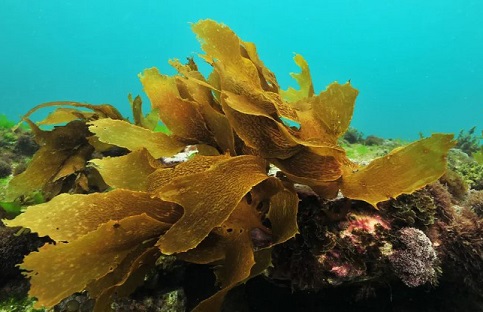Herbs And Phytochemicals: Phlorotannin From Ecklonia Cava Is A Potential Ally In The Fight Against Parkinson’s
Nikhil Prasad Fact checked by:Thailand Medical News Team Jun 29, 2024 9 months, 3 weeks, 6 days, 8 hours, 37 minutes ago
Herbs And Phytochemicals: Parkinson’s disease (PD) is a condition that affects millions worldwide, causing symptoms such as tremors, stiffness, and difficulty with movement. As the population ages, the number of people diagnosed with PD is expected to rise significantly. Current treatments can help manage symptoms but do not stop the disease from progressing. This has led scientists to explore new ways to prevent and treat PD. One promising area of research involves natural compounds found in certain types of seaweed. This
Herbs And Phytochemicals news report is based on a recent study by scientists from Osaka Metropolitan University-Japan and the Aomori University of Health and Welfare-Japan that explored the usage of the phytochemical Phlorotannin obtained from the seaweed called Ecklonia Cava to treat Parkinson’s disease.
 Phlorotannin From Ecklonia Cava Is A Potential Ally In The Fight Against Parkinson’s
The Power of Ecklonia Cava
Phlorotannin From Ecklonia Cava Is A Potential Ally In The Fight Against Parkinson’s
The Power of Ecklonia Cava
Ecklonia cava, a type of brown seaweed found in the Pacific Ocean, is rich in polyphenols - compounds known for their antioxidant properties. Researchers have been studying these polyphenols to understand how they might protect against neurodegenerative diseases like PD.
Understanding Parkinson’s Disease
Parkinson’s disease is primarily caused by the loss of dopamine-producing neurons in a part of the brain called the substantia nigra. Dopamine is a crucial neurotransmitter for controlling movement. As these neurons die, people with PD experience a range of symptoms, including motor impairments and non-motor issues like depression and cognitive decline.
The Role of Oxidative Stress
One of the key factors in the progression of PD is oxidative stress, which occurs when there is an imbalance between free radicals and antioxidants in the body. Free radicals can damage cells, proteins, and DNA, contributing to the death of neurons. This is where antioxidants come into play - they neutralize free radicals and help protect cells from damage.
How Ecklonia Cava Helps
The polyphenols in Ecklonia cava, particularly phlorotannins, have shown significant promise in reducing oxidative stress. In laboratory studies, these compounds have been found to boost the activity of antioxidant enzymes and enhance the body’s natural defense mechanisms.
Key Findings from Recent Research
The Japanese study team conducted experiments using human neuroblastoma cells and mice models of PD. They discovered that Ecklonia cava polyphenols (ECPs) helped mitigate neuronal damage caused by a toxin called rotenone. Rotenone is often used in research to simulate PD because it induces similar oxidative stress and neuronal damage.
Enhancing Antioxidant Defenses
One of the critical findings was that ECPs enhanced the expression and act
ivity of an antioxidant enzyme called NAD(P)H quinone oxidoreductase 1 (NQO1). This enzyme plays a vital role in protecting cells from oxidative damage. By increasing NQO1 activity, ECPs helped reduce the levels of harmful reactive oxygen species (ROS) in the cells.
Activating Protective Pathways
ECPs also activated the Nrf2-ARE pathway, a crucial mechanism that helps cells respond to oxidative stress. The Nrf2 protein moves into the nucleus of the cell and turns on genes that produce antioxidant proteins. In the presence of ECPs, there was a significant increase in Nrf2 activity, suggesting that these compounds can help bolster the cell’s natural defenses.
Benefits Observed in Animal Studies
In experiments with mice, those treated with ECPs showed significant improvements in motor functions. Tests like the pole test and wire-hanging test, which measure coordination and muscle strength, indicated that ECP-treated mice performed better than those that did not receive the treatment. Additionally, ECPs helped restore normal intestinal function, which is often impaired in PD.
Looking Ahead
While these findings are promising, more research is needed to fully understand how ECPs can be used in the treatment and prevention of PD. The next steps include clinical trials to determine the safety and efficacy of these compounds in humans.
Conclusion
Ecklonia cava polyphenols represent a promising natural approach to combatting Parkinson’s disease. By enhancing the body’s antioxidant defenses and activating protective pathways, these compounds could help protect against the neuronal damage that leads to PD. As research progresses, there is hope that these findings will lead to new, effective treatments for this debilitating disease.
Final Thoughts
Natural compounds like those found in Ecklonia cava offer exciting potential in the fight against neurodegenerative diseases. With continued research and development, these findings could pave the way for new strategies to protect brain health and improve the lives of those affected by Parkinson’s disease.
The study findings were published in the peer reviewed journal: Nutrients.
https://www.mdpi.com/2072-6643/16/13/2076
For the latest on
Herbs And Phytochemicals, keep on logging to Thailand Medical News.
Read Also:
https://www.thailandmedical.news/news/researchers-warn-that-sars-cov-2-is-triggering-neurodegenerative-diseases-like-parkinsons
https://www.thailandmedical.news/news/ferroptosis-possibly-behind-covid-19-induced-parkinson-s-disease-neurological-manifestations
